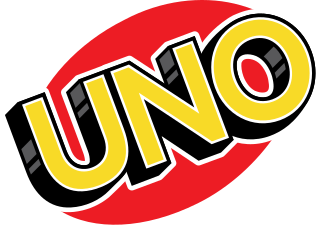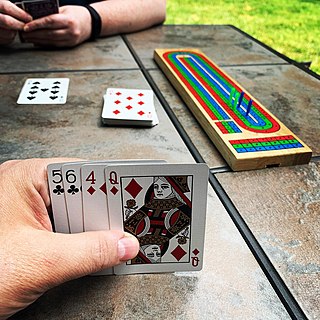
In the card game of poker, a bluff is a bet or raise made with a hand which is not thought to be the best hand. To bluff is to make such a bet. The objective of a bluff is to induce a fold by at least one opponent who holds a better hand. The size and frequency of a bluff determines its profitability to the bluffer. By extension, the phrase "calling somebody's bluff" is often used outside the context of poker to describe situations where one person demands that another proves a claim, or proves that they are not being deceptive.

Uno, stylized as UNO, is a proprietary American shedding-type card game originally developed in 1971 by Merle Robbins in Reading, Ohio, a suburb of Cincinnati, that housed International Games Inc., a gaming company acquired by Mattel on January 23, 1992.

Cribbage, or crib, is a card game, traditionally for two players, that involves playing and grouping cards in combinations which gain points. It can be adapted for three or four players.

Sorry! is a board game that is based on the ancient Indian cross and circle game Pachisi. Players move their three or four pieces around the board, attempting to get all of their pieces "home" before any other player. Originally manufactured by W.H. Storey & Co in England and now by Hasbro, Sorry! is marketed for two to four players, ages 6 and up. The game title comes from the many ways in which a player can negate the progress of another, while issuing an apologetic "Sorry!"

Crazy Taxi 3: High Roller is the third video game in Sega's Crazy Taxi series. It was originally released for the Xbox, followed by an arcade release under the title Crazy Taxi: High Roller for the Sega Chihiro game board and then a Microsoft Windows release. It expands on the previous two games with additional locations, taxis and other features.

Trax is a two-player abstract strategy game of loops and lines invented by David Smith in 1980.
In tabletop games and video games, game mechanics are the rules or ludemes that govern and guide the player's actions, as well as the game's response to them. A rule is an instruction on how to play, a ludeme is an element of play like the L-shaped move of the knight in chess. A game's mechanics thus effectively specify how the game will work for the people who play it.

Ticket to Ride is a railway-themed German-style board game designed by Alan R. Moon. It was illustrated by Julien Delval and Cyrille Daujean and published in 2004 by Days of Wonder. The game is also known as Zug um Zug (German), Les Aventuriers du Rail (French), Aventureros al Tren (Spanish), Wsiąść do pociągu (Polish), and Menolippu (Finnish).

Briscola is one of Italy's most popular games, together with Scopa and Tressette (Tresette). A little-changed descendant of Brusquembille, the ancestor of Briscan and Bezique, Briscola is a Mediterranean trick-taking, Ace-Ten card game for two to six players played with a standard Italian 40-card deck. The game can also be played with a modern Anglo-French deck, without the eight, nine and ten cards. With three or six players, twos are removed from the deck to ensure the number of cards in the deck is a multiple of the number of players; a single two for three players and all four twos for six players. The four and six-player versions of the game are played as a partnership game of two teams, with players seated such that every player is adjacent to two opponents.

Crazy Taxi is a series of racing games developed by Hitmaker and published by Sega. It was first available as an arcade video game in 1999, then released for the Dreamcast console in 2000. It is the third best-selling Dreamcast game in the United States, selling over a million copies. The game was later ported to the PlayStation 2, GameCube, and IBM PC compatibles with sequels also appearing on the Xbox, Game Boy Advance, and PlayStation Portable systems.

Hare and Tortoise is a Eurogame designed by David Parlett in 1974 and first published by Intellect Games. In 1978 it was released by Ravensburger in Germany, and received generally positive reviews critically and won the 1979 Spiel des Jahres. It has since sold some 2 million units in at least ten languages. The current editions are published by Gibsons Games in the UK, Ravensburger in Germany and Rio Grande Games in the United States.
Scrabble variants are games created by changing the normal Scrabble rules or equipment.

Tile tracking is a technique most commonly associated with the game of Scrabble and similar word games. It refers to the practice of keeping track of letters played on the game board, typically by crossing letters off a score sheet or tracking grid as the tiles are played. Tracking tiles can be an important aid to strategy, especially during the endgame when there are no tiles left to draw, where careful tracking allows each player to deduce the remaining unseen letters on the opponent's final rack. The marking off of each letter from a pre-printed tracking grid as the tiles are played is a standard feature of tournament play.

Crazy Taxi: Fare Wars is a 2007 racing video game developed by Sniper Studios and Black Hole Entertainment, and part of the Crazy Taxi series. A compilation of Crazy Taxi (1999) and Crazy Taxi 2 (2001), Black Hole Entertainment ported the original games from the Dreamcast to the PlayStation Portable, while Sniper Studios added a new multiplayer mode. A new single-player campaign was foregone due to budget and time constraints. In the multiplayer, players compete against one another for customers and fare money. While Crazy Taxi received numerous ports, Fare Wars gained notoriety as the sole port of Crazy Taxi 2 outside of the Dreamcast version. It was released in North America, Australia, and Europe in August and September 2007, followed by a Japanese release in August 2008.
The London Cabbie Game or Cabbie is a board game designed by David Drakes and first published by Intellect Games in 1971. Players drive taxicabs through the streets of London, with the winner being the player who accumulates the most tips and fares in a specified time limit.

A game is a structured form of play, usually undertaken for entertainment or fun, and sometimes used as an educational tool. Many games are also considered to be work or art.
Android is an adventure board game designed by Kevin Wilson and Dan Clark, published in 2008 by Fantasy Flight Games. Set in a dystopian future, where the Moon is colonized and androids and clones are real, players take on the roles of murder investigators, investigating a murder within the fictional cities of New Angeles and Heinlein, a colony on the Moon. Players attempt to gain Victory Points by solving the murder, solving the conspiracy, and/or resolving the investigators' personal issues. The player with the most Victory Points wins the game.

Café International is a 1989 tile-laying board game created by Rudi Hoffmann that won the Spiel des Jahres in 1989.

Takenoko is a board game created by Antoine Bauza and published by Bombyx and Matagot in 2011. Matagot also produced a Collector's Edition which features deluxe, over-sized pieces and game board.

The following is a glossary of terms used in dominoes. Besides the terms listed here, there are numerous regional or local slang terms. Terms in this glossary should not be game-specific, i.e. specific to one particular version of dominoes, but apply to a wide range of domino games. For glossaries that relate primarily to one game or family of similar games, see the relevant article.














